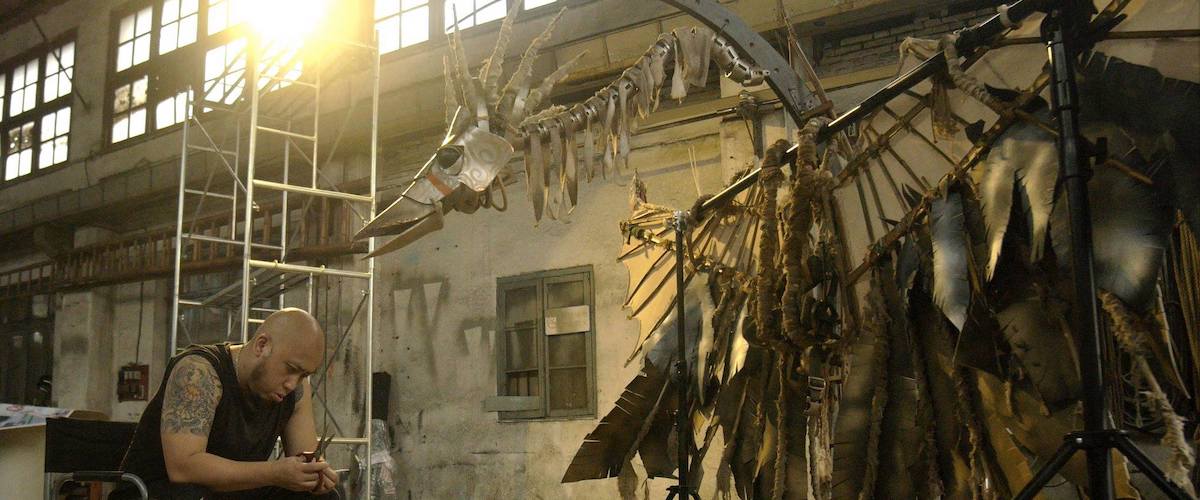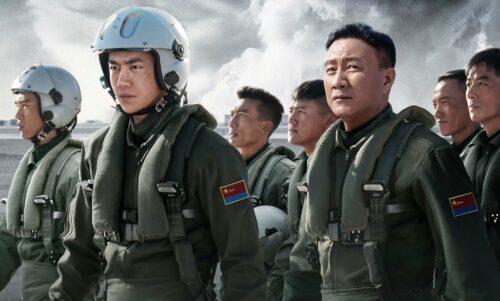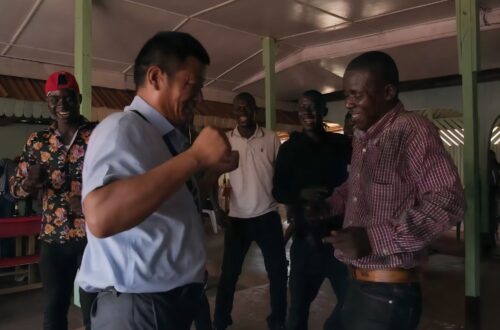‘Our Time Machine’: A bittersweet documentary on love, art, and dementia
A short, stylistic documentary that examines the love between a father and son, the difficulty of creating art, the challenges of dementia, and the importance of perseverance through anguish.

In the opening moments of Our Time Machine (时光机 shíguāng jī), a documentary by directors Sūn Yáng 孙扬 and S. Leo Chiang (江松长 Jiāng Sōngcháng), we’re treated to a series of pictures that look like they were swiped from a dream. In the very first, a man in a dog suit stares at a giant pocket watch hanging from a tree. Another subject, wearing a small white parachute, holds his bike over a rooftop, as though he’s about to take flight. The creator behind these otherworldly, strangely pleasing images is Maleonn, a Shanghai-based artist who once toured around China in a mobile studio van, taking pictures of the people he met on the way.
Our Time Machine chronicles Maleonn’s effort to move into a medium very dear to his family: theater. Maleonn’s father Mǎ Kē 马科 was once a prolific director of Chinese operas, and his mother Zheng Wei Tong (童正维 Tóng Zhèngwéi) acted in plays. Like many artists of their generation, the Cultural Revolution tore Ma and Zheng away from their art, sending them to do agricultural work in the countryside. When Ma could finally return to directing, he devoted himself to the stage so intensely that he really didn’t get to know his son until the boy was 14. Now in his 40s, Maleonn begins to envision Papa’s Time Machine (爸爸的时光机 bàba de shíguāng jī), an autobiographical puppet play about a boy who builds a time machine to relive precious memories with his elderly dad.
The theme of the play is especially personal for Maleonn. His father has Alzheimer’s, making Papa’s Time Machine a sort of capsule to preserve their memories with one another. The artist’s vision is a unique one. He blends shadowplay, stage effects, and mechanical, life-sized puppets to visualize the haziness and nostalgia of the past. His puppeteers bring these automatons to life with remarkable skill, moving intricately and speaking in a special “puppet dialect.” As much as they struggle with the creative side of art, constructing their actors and props, Maleonn and his troupe must also deal with the frustration of finances.
With such an original project, Maleonn finds it difficult to get the funding that his crew needs. The process to get the production moving seems to stumble back with every step forward. He picks up a director, but has to turn away a potential backer because their support would bring creative interference. After a successful sneak preview of the play, Maleonn’s troupe travels all the way to New York in search of backers. Makuji, the boy puppet, brings smiles to passersby as the crew walks him to a fundraising forum. Maleonn, however, ends up returning to China without a single new supporter.
The fight to put Papa’s Time Machine on stage is not just an artistic or financial strain, but also an emotional one. By devoting himself to the play, is Maleonn not neglecting the man he’s paying tribute to? Our Time Machine raises this question as it explores Maleonn’s relationship with his parents, a highlight of the film. These scenes of family drama are bluntly honest and relatable. Maleonn is well-aware that his work doesn’t bring in a lot of money, and he’s disappointed that he can’t buy his parents a house. By working so hard, Maleonn has largely left his mother to care for his father. In one poignant scene, she’s reduced to tears, pointing out to her son that, “In other families, everyone shares the burden.”
While its subject might be unusual and freewheeling, Our Time Machine is more conventionally constructed. There’s nothing wrong with a standard documentary approach, but stylistically, Our Time Machine is at its most interesting when it takes advantage of Maleonn’s fantastical, retrofuturistic designs. When Maleonn falls asleep during one scene, for example, all the turmoil of his production and family life appear to explode through a chilling montage of sentient puppets, howling masks, and a monstrous eyeball with arms and legs. The actual footage we see of Papa’s Time Machine, so long in the making, is likewise dazzling, but brief.
If the documentary could have tapped more into Maleonn’s imagination, it doesn’t pull any punches in capturing the rawness and depth of its subjects. Our Time Machine is a short, beautiful movie, and it manages to say a lot. Generally-speaking, it’s the examination of the love between a father and son, yet it packs so much more into its main theme: the difficulty in being an artist, the challenges in caring for a loved one with dementia, the sadness that comes with facing the transience of memory and mortality. Despite all the anguish it deals with, Our Time Machine ends on the bittersweet, an affirmation that life is a regenerating cycle, not a strict line with a definite beginning and end.
Our Time Machine is currently screening in theaters virtually in the United States. You can find a screening on its website here, or watch the movie on PBS here.






